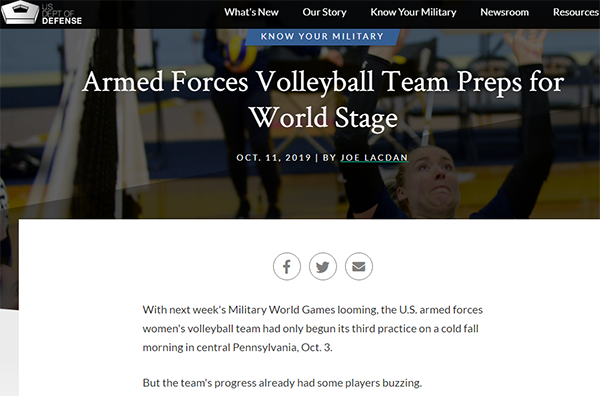Source: US Department of Defense
With next week's Military World Games looming, the U.S. armed forces women's volleyball team had only begun its third practice on a cold fall morning in central Pennsylvania, Oct. 3.
But the team's progress already had some players buzzing.
The U.S. women will compete against some of the world's best volleyball players at the 7th Council of International Sports for Military, or CISM, Military World Games in Wuhan, China, Oct. 18-28. Athletes from more than 100 countries compete at the CISM games, traditionally held a year before the summer Olympics.
Seven U.S. players have competed in past CISMs, including Air Force Capts. Abby Hall and Hillary Keltner. Keltner, an Air Force Academy graduate who competed for the Falcons' women's team, will serve as setter. Hall, who competed for Embry-Riddle Aeronautical University in Daytona Beach, Florida, is a 6-foot outside hitter.
"The level of play, I think, is high," said middle blocker Army Capt. (Dr.) Justine Stremick. "I think this is going to be a really great team. I think that we're going to be able to play to our full potential."
Stremick, the 2018 Army athlete of the year, returns to the court after missing most of the All-Armed Forces Volleyball Championship with a torn ligament. The 6-foot-2-inch Notre Dame graduate has slowly been progressing back into form to anchor the U.S. defense at the net.
Still, the team has newcomers and lacks the same amount of court time as the opposition on the court. Unlike the Armed Forces women's basketball team, many of the volleyball players only participate in the sport on a part-time basis.
Stremick serves as an Army emergency medicine physician at Fort Belvoir, Virginia. Akokwe Clement spends most of her time as an aircraft maintenance officer for the C-17 Globemaster III, C-5 Galaxy and KC-10 Extender at Travis Air Force Base, California. Hall is an acquisitions officer at Eglin Air Force Base, Florida.
"Our jobs are not to play volleyball," Clement said. "We get this opportunity to play volleyball. It's unfortunate we don't get that time other teams get, but we’ll do our best."
Late changes to opponents' rosters could have U.S. coaches adjusting their game plans. They may not be able to gauge international teams' strengths and weaknesses until they take the court in Wuhan. The team competed against a club team in Fairfield, New Jersey on Oct. 6, and on Oct. 8, they competed against Bloomsburg University in Pennsylvania.
"Physicality-wise, I think we’re good," said U.S. coach Jay Van Vark, who has served as an assistant coach at Ohio State and San Diego State universities. "I think once you put us on the international stage, I'm not sure how we’re going to match up. You start to look at volleyball as a reflective sport, or it's a reaction sport to what your teammates are doing. The biggest issue for us becomes how well can we play together as a group? How connected are they? How much do they react to each other?"
The Armed Forces Volleyball champion Air Force squad lends six of its members to the 11-player roster. Their combined experience, along with Stremick's return, should help the U.S. make a run for medal contention.
Clement, an outside hitter who played the previous two CISMs, said familiarity with their opponents will help their chances. Several of the U.S. players have played against two of the teams in their pool: host China and Canada. Hall added that many of the Air Force and Navy players will benefit from chemistry formed from past competitions.
"Some of the other teams might have professional players on them, but we have a lot of heart and a lot of passion for the sport," Hall said. "We wouldn’t be here if we didn’t."
(Joe Lacdan is assigned to Army News Service.)
Disclaimer: This article was originally produced and published by US Department of Defense. View the original article at US Department of Defense.










